高中英语语法之1名词复数
图片预览
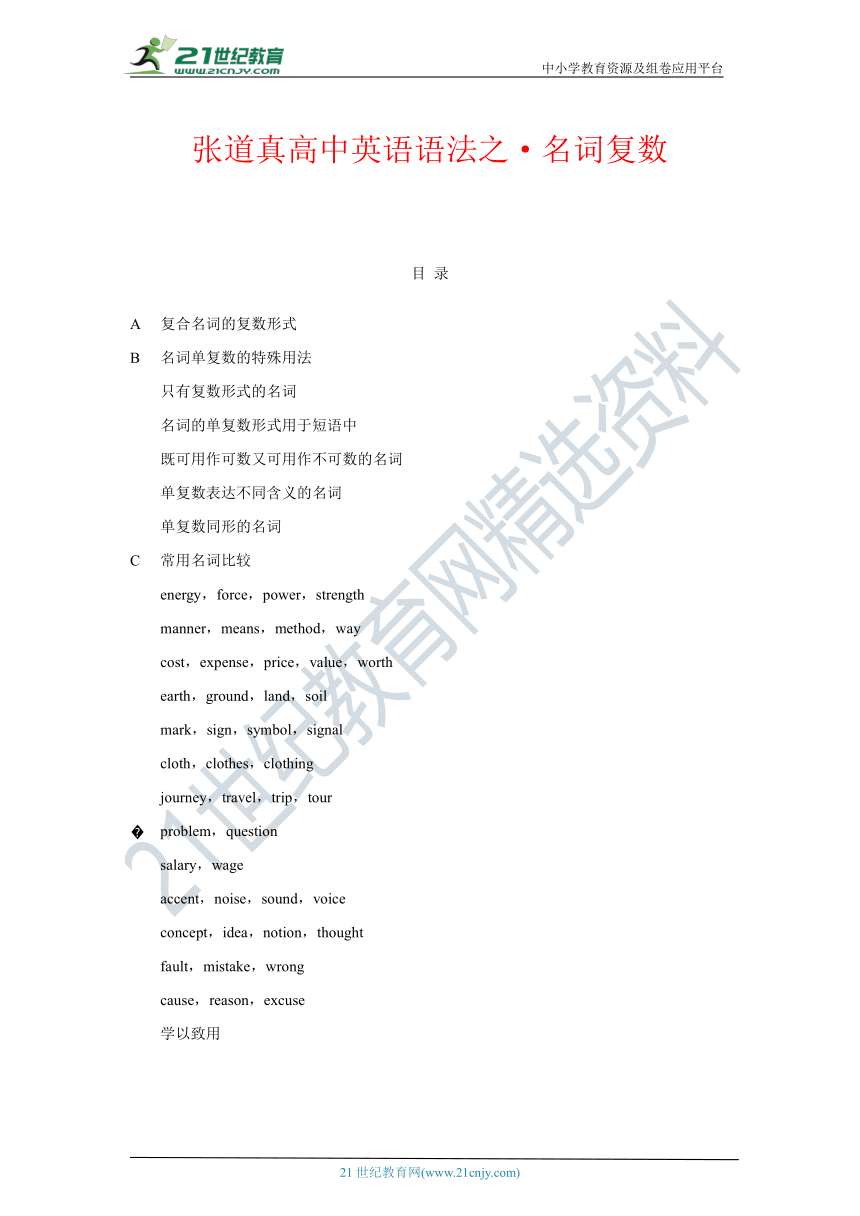
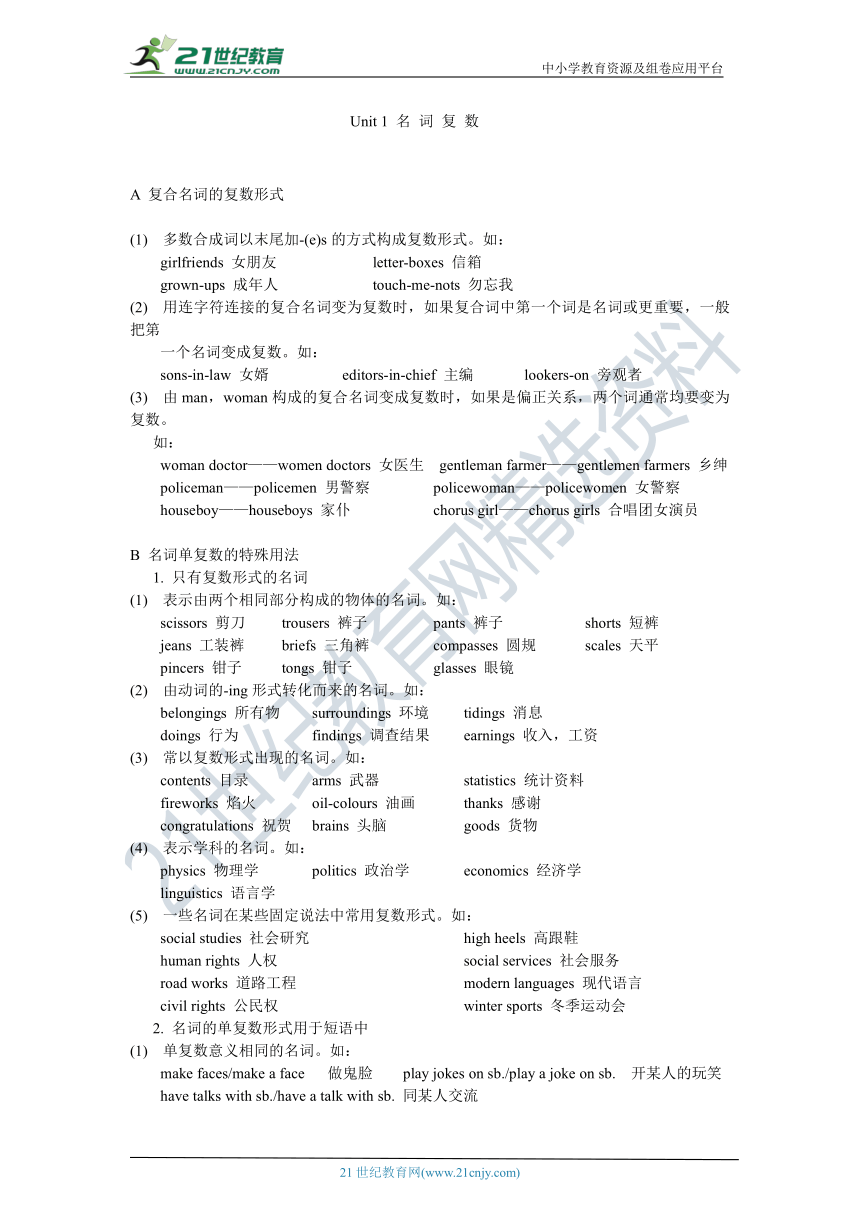
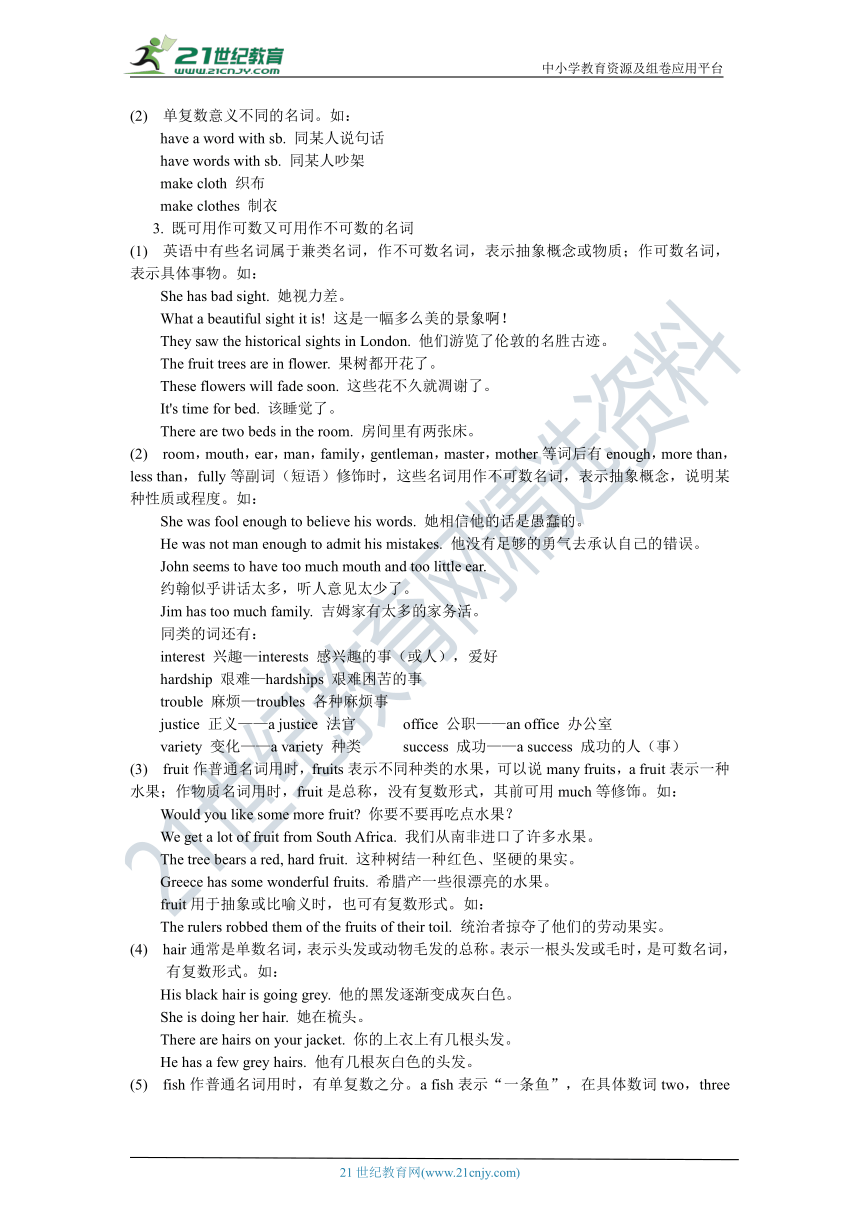
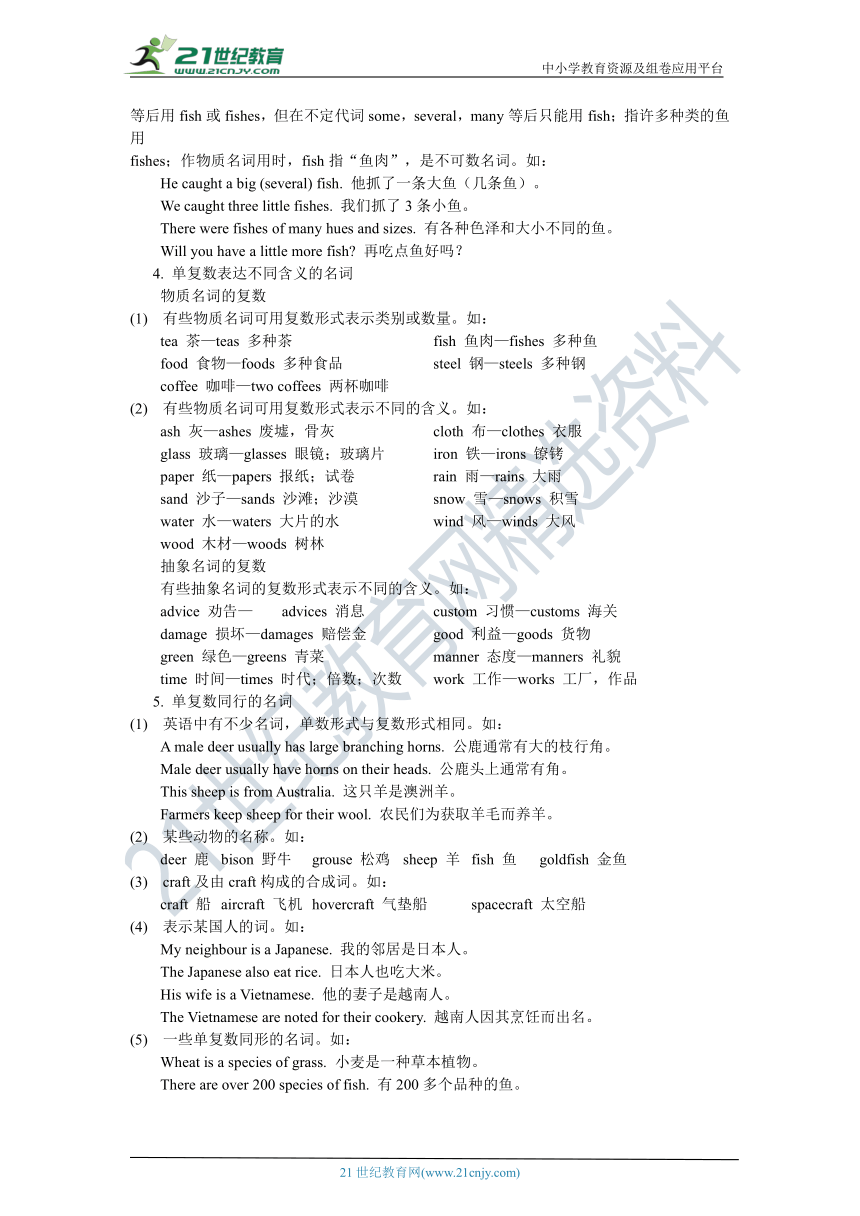
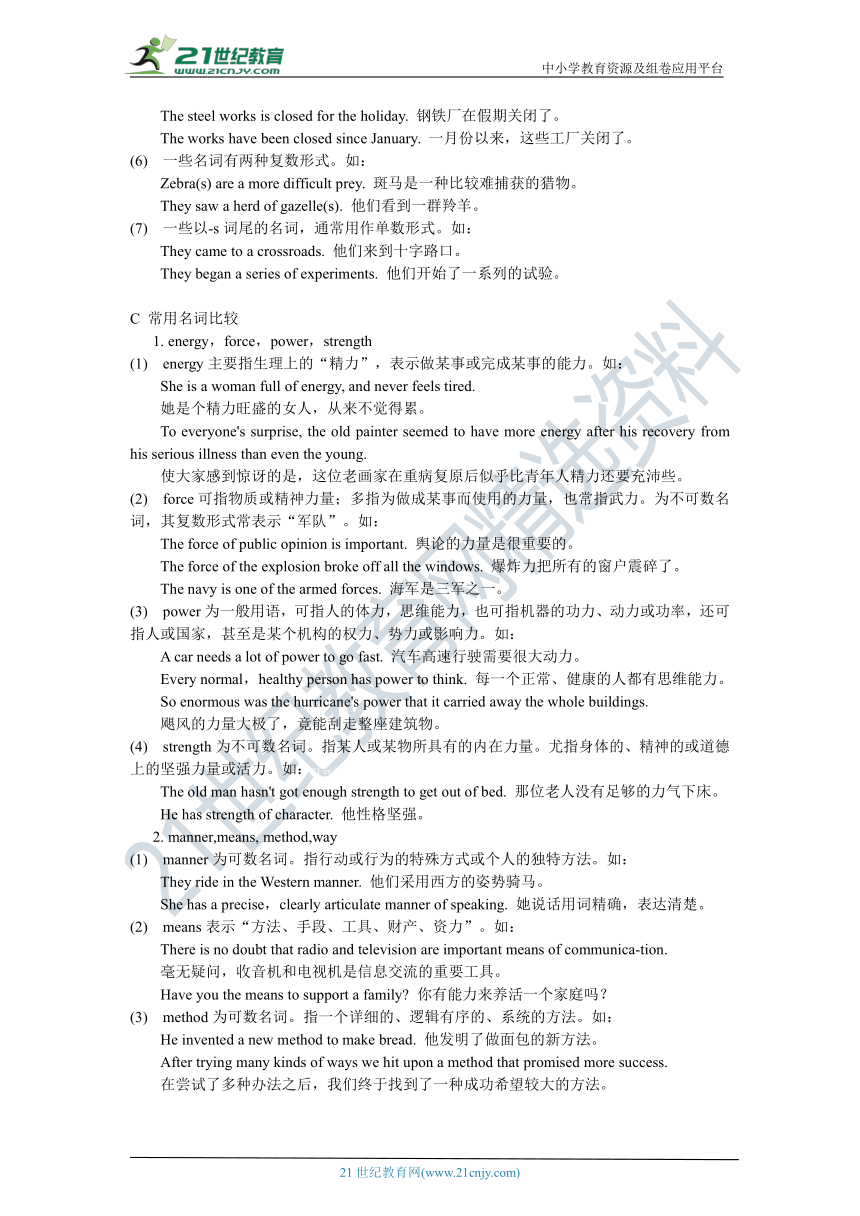
文档简介
中小学教育资源及组卷应用平台
张道真高中英语语法之·名词复数
目 录
A 复合名词的复数形式
B 名词单复数的特殊用法
????只有复数形式的名词
????名词的单复数形式用于短语中
????既可用作可数又可用作不可数的名词
????单复数表达不同含义的名词
????单复数同形的名词
C 常用名词比较
????energy,force,power,strength
????manner,means,method,way
????cost,expense,price,value,worth
????earth,ground,land,soil
????mark,sign,symbol,signal
????cloth,clothes,clothing
????journey,travel,trip,tour
??? problem,question
????salary,wage
accent,noise,sound,voice
concept,idea,notion,thought
fault,mistake,wrong
cause,reason,excuse
学以致用
Unit 1 名 词 复 数21*cnjy*com
A 复合名词的复数形式
(1) 多数合成词以末尾加-(e)s的方式构成复数形式。如:
girlfriends 女朋友 letter-boxes 信箱
grown-ups 成年人 touch-me-nots 勿忘我
用连字符连接的复合名词变为复数时,如果复合词中第一个词是名词或更重要,一般把第
一个名词变成复数。如:
sons-in-law 女婿 editors-in-chief 主编 lookers-on 旁观者
由man,woman构成的复合名词变成复数时,如果是偏正关系,两个词通常均要变为复数。
如:
woman d_octor???_—women doctors 女医生 gentleman farmer——gentlemen farmers 乡绅
policeman——policemen 男警察 policewoman——policewomen 女警察
houseboy——houseboys 家仆 chorus girl——chorus girls 合唱团女演员
B 名词单复数的特殊用法
1. 只有复数形式的名词
(1) 表示由两个相同部分构成的物体的名词。如:
scissors 剪刀 trousers 裤子 pants 裤子 shorts 短裤
jeans 工装裤 briefs 三角裤 compasses 圆规 scales 天平
pincers 钳子 tongs 钳子 glasses 眼镜
(2) 由动词的-ing形式转化而来的名词。如:
belongings 所有物 surroundings 环境 tidings 消息
doings 行为 findings 调查结果 earnings 收入,工资
(3) 常以复数形式出现的名词。如:
contents 目录 arms 武器 statistics 统计资料
fireworks 焰火 oil-colours 油画 thanks 感谢
congratulations 祝贺 brains 头脑 goods 货物
(4) 表示学科的名词。如:
physics 物理学 politics 政治学 economics 经济学
linguistics 语言学
(5) 一些名词在某些固定说法中常用复数形式。如:
social studies 社会研究 high heels 高跟鞋
human rights 人权 social services 社会服务
road works 道路工程 modern languages 现代语言
civil rights 公民权 winter sports 冬季运动会
2. 名词的单复数形式用于短语中
(1) 单复数意义相同的名词。如:
make faces/_make_a_ face 做鬼脸 play jokes on sb./play a joke on sb. 开某人的玩笑
have talks with sb./have a talk with sb. 同某人交流
(2) 单复数意义不同的名词。如:
have a word with sb. 同某人说句话
have words with sb. 同某人吵架
make cloth 织布
make clothes 制衣
3. 既可用作可数又可用作不可数的名词
英语中有些名词属于兼类名词,作不可数名词,表示抽象概念或物质;作可数名词,表示具体事物。如:
She has bad sight. 她视力差。
What a beautiful sight it is! 这是一幅多么美的景象啊!
They saw the historical sights in London. 他们游览了伦敦的名胜古迹。
The fruit trees are in flower. 果树都开花了。
These flowers will fade soon. 这些花不久就凋谢了。
It's time for bed. 该睡觉了。
There are two beds in the room. 房间里有两张床。
room,mouth,_ear???ma_n,family,gentleman,master,mother等词后有enough,more than,
less than,fully等副词(短语)修饰时,这些名词用作不可数名词,表示抽象概念,说明某种性质或程度。如:www.21-cn-jy.com
She was fool enough to believe his words. 她相信他的话是愚蠢的。
He was not man enough to admit his mistakes. 他没有足够的勇气去承认自己的错误。
John seems to have too much mouth and too little ear.
约翰似乎讲话太多,听人意见太少了。
Jim has too much family. 吉姆家有太多的家务活。
同类的词还有:
interest 兴趣—interests 感兴趣的事(或人),爱好
hardship 艰难—hardships 艰难困苦的事
trouble 麻烦—troubles 各种麻烦事
justice 正义——a justice 法官 office 公职——an office 办公室
variety 变化——a variety 种类 success 成功——a success 成功的人(事)
fruit_??????é?????è????¨_时,fruits表示不同种类的水果,可以说many fruits,a fruit表示一种水果;作物质名词用时,fruit是总称,没有复数形式,其前可用much等修饰。如:
Would you like some more fruit? 你要不要再吃点水果?
We get a lot of fruit from South Africa. 我们从南非进口了许多水果。
The tree bears a red, hard fruit. 这种树结一种红色、坚硬的果实。
Greece has some wonderful fruits. 希腊产一些很漂亮的水果。
fruit用于抽象或比喻义时,也可有复数形式。如:
The rulers robbed them of the fruits of their toil. 统治者掠夺了他们的劳动果实。
hair通常是单数名词,表示头发或动物毛发的总称。表示一根头发或毛时,是可数名词,
有复数形式。如:
His black hair is going grey. 他的黑发逐渐变成灰白色。
She is doing her hair. 她在梳头。
There are hairs on your jacket. 你的上衣上有几根头发。
He has a few grey hairs. 他有几根灰白色的头发。
fish作普通名词用时,_???????¤???°??????_。a fish表示“一条鱼”,在具体数词two,three等后用fish或fishes,但在不定代词some,several,many等后只能用fish;指许多种类的鱼用
fishes;作物质名词用时,fish指“鱼肉”,是不可数名词。如:
He caught a big (several) fish. 他抓了一条大鱼(几条鱼)。
We caught three little fishes. 我们抓了3条小鱼。
There were fishes of many hues and sizes. 有各种色泽和大小不同的鱼。
Will you have a little more fish? 再吃点鱼好吗?
4. 单复数表达不同含义的名词
物质名词的复数
(1) 有些物质名词可用复数形式表示类别或数量。如:
tea 茶—teas 多种茶 fish 鱼肉—fishes 多种鱼
food 食物—foods 多种食品 steel 钢—steels 多种钢
coffee 咖啡—two coffees 两杯咖啡
(2) 有些物质名词可用复数形式表示不同的含义。如:
ash 灰—ashes 废墟,骨灰 cloth 布—clothes 衣服
glass 玻璃—glasses 眼镜;玻璃片 iron 铁—irons 镣铐
paper 纸—papers 报纸;试卷 rain 雨—rains 大雨
sand 沙子—sands 沙滩;沙漠 snow 雪—snows 积雪
water 水—waters 大片的水 wind 风—winds 大风
wood 木材—woods 树林
抽象名词的复数
有些抽象名词的复数形式表示不同的含义。如:
advice 劝告— advices 消息 custom 习惯—customs 海关
damage 损坏—damages 赔偿金 good 利益—goods 货物
green 绿色—greens 青菜 manner 态度—manners 礼貌
time 时间—times 时代;倍数;次数 work 工作—works 工厂,作品
5. 单复数同行的名词
(1) 英语中有不少名词,单数形式与复数形式相同。如:
A male deer usually has large branching horns. 公鹿通常有大的枝行角。
Male deer usually have horns on their heads. 公鹿头上通常有角。【出处:21教育名师】
This sheep is from Australia. 这只羊是澳洲羊。
Farmers keep sheep for their wool. 农民们为获取羊毛而养羊。
(2) 某些动物的名称。如:
deer 鹿 bison 野牛 grouse 松鸡 sheep 羊 fish 鱼 goldfish 金鱼
(3) craft及由craft构成的合成词。如:
craft 船 aircraft 飞机 hovercraft 气垫船 spacecraft 太空船
(4) 表示某国人的词。如:
My neighbour is a Japanese. 我的邻居是日本人。
The Japanese also eat rice. 日本人也吃大米。
His wife is a Vietnamese. 他的妻子是越南人。
The Vietnamese are noted for their cookery. 越南人因其烹饪而出名。
(5) 一些单复数同形的名词。如:
Wheat is a species of grass. 小麦是一种草本植物。
There are over 200 species of fish. 有200多个品种的鱼。
The steel works is closed for the holiday. 钢铁厂在假期关闭了。【版权所有:21教育】
The works have been closed since January. 一月份以来,这些工厂关闭了。
(6) 一些名词有两种复数形式。如:
Zebra(s) are a more difficult prey. 斑马是一种比较难捕获的猎物。
They saw a herd of gazelle(s). 他们看到一群羚羊。
(7) 一些以-s词尾的名词,通常用作单数形式。如:
They came to a crossroads. 他们来到十字路口。
They began a series of experiments. 他们开始了一系列的试验。2·1·c·n·j·y
C 常用名词比较
1. energy,force,power,strength
(1) energy主要指生理上的“精力”,表示做某事或完成某事的能力。如:
She is a woman full of energy, and never feels tired.
她是个精力旺盛的女人,从来不觉得累。
To ever_yone's_ surprise, the old painter seemed to have more energy after his recovery from his serious illness than even the young.
使大家感到惊讶的是,这位老画家在重病复原后似乎比青年人精力还要充沛些。
force可指物质或精神力量;多指为做成某事而使用的力量,也常指武力。为不可数名词,其复数形式常表示“军队”。如:
The force of public opinion is important. 舆论的力量是很重要的。
The force of the explosion broke off all the windows. 爆炸力把所有的窗户震碎了。
The navy is one of the armed forces. 海军是三军之一。
power为一般用语,可指人的体力,思维能力,也可指机器的功力、动力或功率,还可指人或国家,甚至是某个机构的权力、势力或影响力。如:
A car needs a lot of power to go fast. 汽车高速行驶需要很大动力。
Every normal,healthy person has power to think. 每一个正常、健康的人都有思维能力。
So enormous was _the_hu_rricane's power that it carried away the whole buildings.
飓风的力量大极了,竟能刮走整座建筑物。
strength为不可数名词。指某人或某物所具有的内在力量。尤指身体的、精神的或道德上的坚强力量或活力。如:21·cn·jy·com
The ol_d_man__hasn't got enough strength to get out of bed. 那位老人没有足够的力气下床。
He has strength of character. 他性格坚强。
2. manner,means, method,way
(1) manner为可数名词。指行动或行为的特殊方式或个人的独特方法。如:
They ride in the Western manner. 他们采用西方的姿势骑马。
She ha_s_a_pr_ecise,clearly articulate manner of speaking. 她说话用词精确,表达清楚。
(2) means表示“方法、手段、工具、财产、资力”。如:
There is no doub_t_that_ radio and television are important means of communica-tion.
毫无疑问,收音机和电视机是信息交流的重要工具。
Have you the means to support a family? 你有能力来养活一个家庭吗?
(3) method为可数名词。指一个详细的、逻辑有序的、系统的方法。如:
He invented a new method to make bread. 他发明了做面包的新方法。
After try_ing_ma_ny kinds of ways we hit upon a method that promised more success.
在尝试了多种办法之后,我们终于找到了一种成功希望较大的方法。
(4) way为可数名词。为常用语,可指一般的方法,也可指个人的或特殊的方式和方法。如:
The way she spoke hurt him. 她说话的方式伤害了他。
They are try_ing_to_ find a way of settling the dispute. 他们正设法寻找解决争端的办法。
3. cost,expense,price,value,worth
cost表示“费用、成本”。指生产某种物品的成本,包括生产中所支付的原料和劳动。也常
表示所付出的代价,甚至生命。如:
As a result,costs will be reduced by as much as 30%. 结果,费用将减少30%。
(2) expense表示“支出、开销”,指花费金钱、时间或精力。如:
Do you know at whose expense your visit to New Zealand will be?
你知道谁为你的新西兰之行付费吗?
(3) price意为“价格、价钱、定价”,指商品出售的单价。如:
They sold the daily products at high price in that supermarket.
他们在那家超市高价出售日用品。
(4) value意为“价值”,指不可用金钱衡量的价值。如:
The winner will receive a prize to the value of $ 1,000.
获胜者将得到价值1 000美元的奖项。
(5) worth意为“价值”,强调本身所存在的,是可贵的。如:
It was worth 50,000 frances at most. 这最多值5万法郎。
4. earht,ground,land,soil
(1) earth表示“地,地球,泥土”,着重指“大地”,以区别于天空。作“泥土”讲时,常用于区别坚硬的岩石。如:
I'll put the little plants in the earth. 我将把小植物种在泥土里。2-1-c-n-j-y
(2) ground表示“地,土地”。主要指大地表面,也指土壤、场地;引申义为“根据、理由”。如:
He learnt how__to_cl_ean rough ground before planting crops. 他学着如何在种庄稼前整地。
(3) l_andè?¨?¤????_陆地,土地,地”,是河流和海洋的相对用语。用于指土壤或土地时,着重指它的性质、用途等。有时泛指大地,也可以作“国家、地产”讲。如:
The rocky soil has been turned into rich land. 多岩石的土壤变成了矿物质丰富的土壤。
(4) soil表示“土壤,土地”,指可以生长植物而且富含有机物的沃土,适宜农耕。如:
He studied how to improve soil conditions. 他研究如何改善土壤条件。
5. mark,sign,symbol,signal
(1) mark常指一个可见的痕迹或印记,或一个特别的特征或特点。如:
The _split__coffee has left a mark on the table cloth. 洒出来的咖啡在桌布上留下了印渍。
Generosity is a mark of great character. 慷慨是崇高品质的一种标志。
(2) sign为可数名词。作为最普通用语,指具有固定意义的标志或符号,常可替代其他词。如:
All _the_si_gns at the moment point to a early resumption of the fighting between the two countries. 目前的一切迹象都表明,这两个国家将很快重新开战。
He developed signs of a cold. 他出现了感冒症状。
(3) signal表示“暗号,信号”。如:
There the__elect_rical signal is changed back into sound. 在那儿电信号将转化为声音。
(4) symbol为可数名词。指作为象征或表达某种深邃意义的特殊事物。如:
The “ V ” sign i_s_the__symbol of the unconquerable will of the occupied territo-ries.
“V”这个标志表明了占领区民众不可征服的意志。
6. cloth,clothes,clothing
(1) c_loth??????_衣服等用的材料,如布料、毛料、丝绸等,是名词,不能直接和不定冠词a连用。当cloth和某些词构成复合名词,表示特殊用途的一块布时,是可数名词。如:
woollen cloth 毛料 a table cloth 一块桌布
a dish cloth 一块洗碗布
(2) clothes指具体的_è????????????¤???°_形式,不能用数词修饰,可以用my,those,many等词修饰。单独作主语时,谓语动词用复数形式;但a suit of clothes作主语时,谓语动词用单数形式。如:21世纪教育网版权所有
He wears fine clothes. 他衣着讲究。
(3) clothing是衣服的总称,含义较抽象,泛指“衣着”这一概念,而且包括鞋、帽等。如:
Our chief concern has been food,clothing and shelter for everyone.
我们主要关心的是人人都有饭吃,有衣穿,有房子住。
articles of clothing 各种衣着用品 winter clothing 冬季衣着21教育名师原创作品
7. journey,travel,trip,tour
(1) journey为可数名词。是正式用语,多指有明确目的地的陆上长途旅行。如:
He decided to make the journey to Mexico by car. 他决定乘汽车前往墨西哥。
I wish you a pleasant journey. 祝你旅途愉快。
(2) travel为不可数名词。泛指各种旅行或游历,可与其他词通用。如:
They had eight days' travel by car. 他们乘汽车游历了8天。
At present group travel is encouraged. 现在提倡团体旅行。【来源:21cnj*y.co*m】
(3) trip为可数名词。为一般用语,多指两地之间的短途旅行,不强调旅行的目的、方式或交通工具。如:
I took a trip to England last year. 去年我到英国旅行了一趟。
It's only a half-hour's trip from here to the bank. 从这里到银行只有半小时的路程。
(4) tour__???????????????_的路线,事先预定了一些逗留地点,旅行结束后仍回原地的旅游,其主要目的多为观光、视察或进行其他活动,路程一般都比较长。如:
My tour lasted two months. 我的旅行持续了两个月。
He is in the United States on a speaking tour. 他正在美国作巡回演讲。
8. problem,question
(1) problem总是与“困难”相联系,它可以指社会问题,教学问题。这种“问题”是有待“解决”的,与之搭配的动词为solve。如:
We solved all the problems. 我们解决了所有的问题。
That's a social problem. 那是一个社会问题。
(2) question总是与“疑问,质问,询问”相联系,这种“问题”是有待“回答”的,常与动词answer连用。如:
He asked me some questions. 他问了我一些问题。
There is no question that she is honest. 毫无疑问,她为人很诚实。
9. salary,wage
(1) salary为可数名词。指按月或按年发放的薪水,领取薪水者通常是经过培训而具有特殊技能或专业知识的人。如:
He gets a good _salary_,but he always borrows money from his friends and never pays it back.
他的工资待遇很好,但他总是向朋友借钱而又从不归还。
Teachers,gove_rnment_ officials and clerks receive salaries. 教师,政府官员和职员领取薪水。
(2) wage为可数名词,通常用作复数形式。一般指按小时、按日、按周等付给工人的工资,领取工资者通常是从事体力劳动的人。如:
His wages are $ 460 a week. 他的工资是每周460美元。
The railroad workers have asked for a wage increase. 铁路工人要求增加工资。
10. accent,noise,sound,voice
(1) accent意为“口音”,指不同地方的人说话的口音。如:
According to her accent,I know she is from Guangdong Province.
听她的口音,我知道她是广东人。
(2) noise可泛指一般的声音、声响;还可指高的、不悦耳的、不想听到的或不喜欢的响声或声音,即“噪音”。如:
—What's wrong with my car? 我的车出了什么毛病?
—The engine makes funny noise. 发动机发出了奇怪的响声。
The only noise was the wind in the pines. 唯一的响声是松林中的风声。
(3) sound_??????é????¨è?????_指人们感觉到的各式各样的声音,这种声音既可以是悦耳的,也可以是难听的;既可以是有意义的,也可以是无意义的。表示抽象意义的声音或泛指声音时,是不可数名词;表示具体的声音或某种特殊的声音时,是可数名词。如:
Sound travels slower than light. 声音传播比光慢。
Strange sounds came from the next room. 有种奇怪的声音从隔壁房间传过来。
(4) voice为可数名词。指人说话、唱歌、喊叫等发出的声音;用于比喻意义时表示“意见”。如:
Our voices echoed in the empty house. 我们的声音在空屋子里回荡。
Yet ever sinc_e_then_,people at home and abroad have different voices about it.
然而,从那时起,国内外的人对这个政策一直有不同的看法。
11. concept,idea,notion,thought
(1) concept着重指概念或观念。如:
A concept is the product of the mind. 概念是思想的产物。
(2) idea是指经过思考或想象后产生的想法、主意、念头。如:
The boy t_hought_ and thought. Then he had an idea. 那孩子想了又想,终于想出了一个办法。21·世纪*教育网
(3) notion指一般的或模糊的概念。如:
He has got a notion into his head. 他头脑中有了一个想法。
(4) thought指经过思考后产生的想法。如:
On second thought I considered it better not to go. 再三考虑,我认为不去为好。
12. fault,mistake,wrong
(1) fault多指性格上的弱点,行为上的过失,强调过失应负的责任。有时fault也可以用来代替mistake。如:
a fault / mistake in grammar 语法错误
It's his own fault that he fails in the examination. 考试不及格是他自己的责任。
(2) mistake意思是“错误,误会,误解”,多指缺乏正确的理解而造成行为上或认识上的错误。如:21教育网
Everyone laughed at the woman's mistake. 大家都嘲笑这个妇女所犯的错误。
He hit me by mistake. 他误打了我。
(3) wrong作名词用时,主要指不符合道德、法规的错误、罪行,不公正的对待、虐待。如:
He doesn't know the difference between right and wrong. 他善恶不分。
13. cause,reason,excuse
(1) cause为可数名词。是造成某种事实或现象的比较直接的原因、起因,或导致某种结果的客观条件、情况、时间、力量等。如:
The cause of the fire was a cigarette end. 起火的原因是一个烟蒂。
These causes led to a bad result. 这些原因导致了不良的后果。
reason强调“推理”,多指对事物的起因进行逻辑推理,从而得出合乎情理的解释。如:
The airport wa_s_buil_t during the war,but for some reason it could not be used then.
这个飞机场是在大战期间建造的,但是由于某种原因当时没有使用。
The reason that he doesn't come is that he is ill. 他没有来的原因是他病了。
You have no reason to complain. 你没有理由抱怨。
(3) excuse为可数名词。指为了避免责任而设法辩解过错,找出的理由、原因或借口。如:
He made up an excuse for his absence. 他为无故缺席编了一个理由。
He would seize on any excuse to justify himself. 他会随便找个借口为自己辩解。
_21?????????è?????(www.21cnjy.com)_
张道真高中英语语法之·名词复数
目 录
A 复合名词的复数形式
B 名词单复数的特殊用法
????只有复数形式的名词
????名词的单复数形式用于短语中
????既可用作可数又可用作不可数的名词
????单复数表达不同含义的名词
????单复数同形的名词
C 常用名词比较
????energy,force,power,strength
????manner,means,method,way
????cost,expense,price,value,worth
????earth,ground,land,soil
????mark,sign,symbol,signal
????cloth,clothes,clothing
????journey,travel,trip,tour
??? problem,question
????salary,wage
accent,noise,sound,voice
concept,idea,notion,thought
fault,mistake,wrong
cause,reason,excuse
学以致用
Unit 1 名 词 复 数21*cnjy*com
A 复合名词的复数形式
(1) 多数合成词以末尾加-(e)s的方式构成复数形式。如:
girlfriends 女朋友 letter-boxes 信箱
grown-ups 成年人 touch-me-nots 勿忘我
用连字符连接的复合名词变为复数时,如果复合词中第一个词是名词或更重要,一般把第
一个名词变成复数。如:
sons-in-law 女婿 editors-in-chief 主编 lookers-on 旁观者
由man,woman构成的复合名词变成复数时,如果是偏正关系,两个词通常均要变为复数。
如:
woman d_octor???_—women doctors 女医生 gentleman farmer——gentlemen farmers 乡绅
policeman——policemen 男警察 policewoman——policewomen 女警察
houseboy——houseboys 家仆 chorus girl——chorus girls 合唱团女演员
B 名词单复数的特殊用法
1. 只有复数形式的名词
(1) 表示由两个相同部分构成的物体的名词。如:
scissors 剪刀 trousers 裤子 pants 裤子 shorts 短裤
jeans 工装裤 briefs 三角裤 compasses 圆规 scales 天平
pincers 钳子 tongs 钳子 glasses 眼镜
(2) 由动词的-ing形式转化而来的名词。如:
belongings 所有物 surroundings 环境 tidings 消息
doings 行为 findings 调查结果 earnings 收入,工资
(3) 常以复数形式出现的名词。如:
contents 目录 arms 武器 statistics 统计资料
fireworks 焰火 oil-colours 油画 thanks 感谢
congratulations 祝贺 brains 头脑 goods 货物
(4) 表示学科的名词。如:
physics 物理学 politics 政治学 economics 经济学
linguistics 语言学
(5) 一些名词在某些固定说法中常用复数形式。如:
social studies 社会研究 high heels 高跟鞋
human rights 人权 social services 社会服务
road works 道路工程 modern languages 现代语言
civil rights 公民权 winter sports 冬季运动会
2. 名词的单复数形式用于短语中
(1) 单复数意义相同的名词。如:
make faces/_make_a_ face 做鬼脸 play jokes on sb./play a joke on sb. 开某人的玩笑
have talks with sb./have a talk with sb. 同某人交流
(2) 单复数意义不同的名词。如:
have a word with sb. 同某人说句话
have words with sb. 同某人吵架
make cloth 织布
make clothes 制衣
3. 既可用作可数又可用作不可数的名词
英语中有些名词属于兼类名词,作不可数名词,表示抽象概念或物质;作可数名词,表示具体事物。如:
She has bad sight. 她视力差。
What a beautiful sight it is! 这是一幅多么美的景象啊!
They saw the historical sights in London. 他们游览了伦敦的名胜古迹。
The fruit trees are in flower. 果树都开花了。
These flowers will fade soon. 这些花不久就凋谢了。
It's time for bed. 该睡觉了。
There are two beds in the room. 房间里有两张床。
room,mouth,_ear???ma_n,family,gentleman,master,mother等词后有enough,more than,
less than,fully等副词(短语)修饰时,这些名词用作不可数名词,表示抽象概念,说明某种性质或程度。如:www.21-cn-jy.com
She was fool enough to believe his words. 她相信他的话是愚蠢的。
He was not man enough to admit his mistakes. 他没有足够的勇气去承认自己的错误。
John seems to have too much mouth and too little ear.
约翰似乎讲话太多,听人意见太少了。
Jim has too much family. 吉姆家有太多的家务活。
同类的词还有:
interest 兴趣—interests 感兴趣的事(或人),爱好
hardship 艰难—hardships 艰难困苦的事
trouble 麻烦—troubles 各种麻烦事
justice 正义——a justice 法官 office 公职——an office 办公室
variety 变化——a variety 种类 success 成功——a success 成功的人(事)
fruit_??????é?????è????¨_时,fruits表示不同种类的水果,可以说many fruits,a fruit表示一种水果;作物质名词用时,fruit是总称,没有复数形式,其前可用much等修饰。如:
Would you like some more fruit? 你要不要再吃点水果?
We get a lot of fruit from South Africa. 我们从南非进口了许多水果。
The tree bears a red, hard fruit. 这种树结一种红色、坚硬的果实。
Greece has some wonderful fruits. 希腊产一些很漂亮的水果。
fruit用于抽象或比喻义时,也可有复数形式。如:
The rulers robbed them of the fruits of their toil. 统治者掠夺了他们的劳动果实。
hair通常是单数名词,表示头发或动物毛发的总称。表示一根头发或毛时,是可数名词,
有复数形式。如:
His black hair is going grey. 他的黑发逐渐变成灰白色。
She is doing her hair. 她在梳头。
There are hairs on your jacket. 你的上衣上有几根头发。
He has a few grey hairs. 他有几根灰白色的头发。
fish作普通名词用时,_???????¤???°??????_。a fish表示“一条鱼”,在具体数词two,three等后用fish或fishes,但在不定代词some,several,many等后只能用fish;指许多种类的鱼用
fishes;作物质名词用时,fish指“鱼肉”,是不可数名词。如:
He caught a big (several) fish. 他抓了一条大鱼(几条鱼)。
We caught three little fishes. 我们抓了3条小鱼。
There were fishes of many hues and sizes. 有各种色泽和大小不同的鱼。
Will you have a little more fish? 再吃点鱼好吗?
4. 单复数表达不同含义的名词
物质名词的复数
(1) 有些物质名词可用复数形式表示类别或数量。如:
tea 茶—teas 多种茶 fish 鱼肉—fishes 多种鱼
food 食物—foods 多种食品 steel 钢—steels 多种钢
coffee 咖啡—two coffees 两杯咖啡
(2) 有些物质名词可用复数形式表示不同的含义。如:
ash 灰—ashes 废墟,骨灰 cloth 布—clothes 衣服
glass 玻璃—glasses 眼镜;玻璃片 iron 铁—irons 镣铐
paper 纸—papers 报纸;试卷 rain 雨—rains 大雨
sand 沙子—sands 沙滩;沙漠 snow 雪—snows 积雪
water 水—waters 大片的水 wind 风—winds 大风
wood 木材—woods 树林
抽象名词的复数
有些抽象名词的复数形式表示不同的含义。如:
advice 劝告— advices 消息 custom 习惯—customs 海关
damage 损坏—damages 赔偿金 good 利益—goods 货物
green 绿色—greens 青菜 manner 态度—manners 礼貌
time 时间—times 时代;倍数;次数 work 工作—works 工厂,作品
5. 单复数同行的名词
(1) 英语中有不少名词,单数形式与复数形式相同。如:
A male deer usually has large branching horns. 公鹿通常有大的枝行角。
Male deer usually have horns on their heads. 公鹿头上通常有角。【出处:21教育名师】
This sheep is from Australia. 这只羊是澳洲羊。
Farmers keep sheep for their wool. 农民们为获取羊毛而养羊。
(2) 某些动物的名称。如:
deer 鹿 bison 野牛 grouse 松鸡 sheep 羊 fish 鱼 goldfish 金鱼
(3) craft及由craft构成的合成词。如:
craft 船 aircraft 飞机 hovercraft 气垫船 spacecraft 太空船
(4) 表示某国人的词。如:
My neighbour is a Japanese. 我的邻居是日本人。
The Japanese also eat rice. 日本人也吃大米。
His wife is a Vietnamese. 他的妻子是越南人。
The Vietnamese are noted for their cookery. 越南人因其烹饪而出名。
(5) 一些单复数同形的名词。如:
Wheat is a species of grass. 小麦是一种草本植物。
There are over 200 species of fish. 有200多个品种的鱼。
The steel works is closed for the holiday. 钢铁厂在假期关闭了。【版权所有:21教育】
The works have been closed since January. 一月份以来,这些工厂关闭了。
(6) 一些名词有两种复数形式。如:
Zebra(s) are a more difficult prey. 斑马是一种比较难捕获的猎物。
They saw a herd of gazelle(s). 他们看到一群羚羊。
(7) 一些以-s词尾的名词,通常用作单数形式。如:
They came to a crossroads. 他们来到十字路口。
They began a series of experiments. 他们开始了一系列的试验。2·1·c·n·j·y
C 常用名词比较
1. energy,force,power,strength
(1) energy主要指生理上的“精力”,表示做某事或完成某事的能力。如:
She is a woman full of energy, and never feels tired.
她是个精力旺盛的女人,从来不觉得累。
To ever_yone's_ surprise, the old painter seemed to have more energy after his recovery from his serious illness than even the young.
使大家感到惊讶的是,这位老画家在重病复原后似乎比青年人精力还要充沛些。
force可指物质或精神力量;多指为做成某事而使用的力量,也常指武力。为不可数名词,其复数形式常表示“军队”。如:
The force of public opinion is important. 舆论的力量是很重要的。
The force of the explosion broke off all the windows. 爆炸力把所有的窗户震碎了。
The navy is one of the armed forces. 海军是三军之一。
power为一般用语,可指人的体力,思维能力,也可指机器的功力、动力或功率,还可指人或国家,甚至是某个机构的权力、势力或影响力。如:
A car needs a lot of power to go fast. 汽车高速行驶需要很大动力。
Every normal,healthy person has power to think. 每一个正常、健康的人都有思维能力。
So enormous was _the_hu_rricane's power that it carried away the whole buildings.
飓风的力量大极了,竟能刮走整座建筑物。
strength为不可数名词。指某人或某物所具有的内在力量。尤指身体的、精神的或道德上的坚强力量或活力。如:21·cn·jy·com
The ol_d_man__hasn't got enough strength to get out of bed. 那位老人没有足够的力气下床。
He has strength of character. 他性格坚强。
2. manner,means, method,way
(1) manner为可数名词。指行动或行为的特殊方式或个人的独特方法。如:
They ride in the Western manner. 他们采用西方的姿势骑马。
She ha_s_a_pr_ecise,clearly articulate manner of speaking. 她说话用词精确,表达清楚。
(2) means表示“方法、手段、工具、财产、资力”。如:
There is no doub_t_that_ radio and television are important means of communica-tion.
毫无疑问,收音机和电视机是信息交流的重要工具。
Have you the means to support a family? 你有能力来养活一个家庭吗?
(3) method为可数名词。指一个详细的、逻辑有序的、系统的方法。如:
He invented a new method to make bread. 他发明了做面包的新方法。
After try_ing_ma_ny kinds of ways we hit upon a method that promised more success.
在尝试了多种办法之后,我们终于找到了一种成功希望较大的方法。
(4) way为可数名词。为常用语,可指一般的方法,也可指个人的或特殊的方式和方法。如:
The way she spoke hurt him. 她说话的方式伤害了他。
They are try_ing_to_ find a way of settling the dispute. 他们正设法寻找解决争端的办法。
3. cost,expense,price,value,worth
cost表示“费用、成本”。指生产某种物品的成本,包括生产中所支付的原料和劳动。也常
表示所付出的代价,甚至生命。如:
As a result,costs will be reduced by as much as 30%. 结果,费用将减少30%。
(2) expense表示“支出、开销”,指花费金钱、时间或精力。如:
Do you know at whose expense your visit to New Zealand will be?
你知道谁为你的新西兰之行付费吗?
(3) price意为“价格、价钱、定价”,指商品出售的单价。如:
They sold the daily products at high price in that supermarket.
他们在那家超市高价出售日用品。
(4) value意为“价值”,指不可用金钱衡量的价值。如:
The winner will receive a prize to the value of $ 1,000.
获胜者将得到价值1 000美元的奖项。
(5) worth意为“价值”,强调本身所存在的,是可贵的。如:
It was worth 50,000 frances at most. 这最多值5万法郎。
4. earht,ground,land,soil
(1) earth表示“地,地球,泥土”,着重指“大地”,以区别于天空。作“泥土”讲时,常用于区别坚硬的岩石。如:
I'll put the little plants in the earth. 我将把小植物种在泥土里。2-1-c-n-j-y
(2) ground表示“地,土地”。主要指大地表面,也指土壤、场地;引申义为“根据、理由”。如:
He learnt how__to_cl_ean rough ground before planting crops. 他学着如何在种庄稼前整地。
(3) l_andè?¨?¤????_陆地,土地,地”,是河流和海洋的相对用语。用于指土壤或土地时,着重指它的性质、用途等。有时泛指大地,也可以作“国家、地产”讲。如:
The rocky soil has been turned into rich land. 多岩石的土壤变成了矿物质丰富的土壤。
(4) soil表示“土壤,土地”,指可以生长植物而且富含有机物的沃土,适宜农耕。如:
He studied how to improve soil conditions. 他研究如何改善土壤条件。
5. mark,sign,symbol,signal
(1) mark常指一个可见的痕迹或印记,或一个特别的特征或特点。如:
The _split__coffee has left a mark on the table cloth. 洒出来的咖啡在桌布上留下了印渍。
Generosity is a mark of great character. 慷慨是崇高品质的一种标志。
(2) sign为可数名词。作为最普通用语,指具有固定意义的标志或符号,常可替代其他词。如:
All _the_si_gns at the moment point to a early resumption of the fighting between the two countries. 目前的一切迹象都表明,这两个国家将很快重新开战。
He developed signs of a cold. 他出现了感冒症状。
(3) signal表示“暗号,信号”。如:
There the__elect_rical signal is changed back into sound. 在那儿电信号将转化为声音。
(4) symbol为可数名词。指作为象征或表达某种深邃意义的特殊事物。如:
The “ V ” sign i_s_the__symbol of the unconquerable will of the occupied territo-ries.
“V”这个标志表明了占领区民众不可征服的意志。
6. cloth,clothes,clothing
(1) c_loth??????_衣服等用的材料,如布料、毛料、丝绸等,是名词,不能直接和不定冠词a连用。当cloth和某些词构成复合名词,表示特殊用途的一块布时,是可数名词。如:
woollen cloth 毛料 a table cloth 一块桌布
a dish cloth 一块洗碗布
(2) clothes指具体的_è????????????¤???°_形式,不能用数词修饰,可以用my,those,many等词修饰。单独作主语时,谓语动词用复数形式;但a suit of clothes作主语时,谓语动词用单数形式。如:21世纪教育网版权所有
He wears fine clothes. 他衣着讲究。
(3) clothing是衣服的总称,含义较抽象,泛指“衣着”这一概念,而且包括鞋、帽等。如:
Our chief concern has been food,clothing and shelter for everyone.
我们主要关心的是人人都有饭吃,有衣穿,有房子住。
articles of clothing 各种衣着用品 winter clothing 冬季衣着21教育名师原创作品
7. journey,travel,trip,tour
(1) journey为可数名词。是正式用语,多指有明确目的地的陆上长途旅行。如:
He decided to make the journey to Mexico by car. 他决定乘汽车前往墨西哥。
I wish you a pleasant journey. 祝你旅途愉快。
(2) travel为不可数名词。泛指各种旅行或游历,可与其他词通用。如:
They had eight days' travel by car. 他们乘汽车游历了8天。
At present group travel is encouraged. 现在提倡团体旅行。【来源:21cnj*y.co*m】
(3) trip为可数名词。为一般用语,多指两地之间的短途旅行,不强调旅行的目的、方式或交通工具。如:
I took a trip to England last year. 去年我到英国旅行了一趟。
It's only a half-hour's trip from here to the bank. 从这里到银行只有半小时的路程。
(4) tour__???????????????_的路线,事先预定了一些逗留地点,旅行结束后仍回原地的旅游,其主要目的多为观光、视察或进行其他活动,路程一般都比较长。如:
My tour lasted two months. 我的旅行持续了两个月。
He is in the United States on a speaking tour. 他正在美国作巡回演讲。
8. problem,question
(1) problem总是与“困难”相联系,它可以指社会问题,教学问题。这种“问题”是有待“解决”的,与之搭配的动词为solve。如:
We solved all the problems. 我们解决了所有的问题。
That's a social problem. 那是一个社会问题。
(2) question总是与“疑问,质问,询问”相联系,这种“问题”是有待“回答”的,常与动词answer连用。如:
He asked me some questions. 他问了我一些问题。
There is no question that she is honest. 毫无疑问,她为人很诚实。
9. salary,wage
(1) salary为可数名词。指按月或按年发放的薪水,领取薪水者通常是经过培训而具有特殊技能或专业知识的人。如:
He gets a good _salary_,but he always borrows money from his friends and never pays it back.
他的工资待遇很好,但他总是向朋友借钱而又从不归还。
Teachers,gove_rnment_ officials and clerks receive salaries. 教师,政府官员和职员领取薪水。
(2) wage为可数名词,通常用作复数形式。一般指按小时、按日、按周等付给工人的工资,领取工资者通常是从事体力劳动的人。如:
His wages are $ 460 a week. 他的工资是每周460美元。
The railroad workers have asked for a wage increase. 铁路工人要求增加工资。
10. accent,noise,sound,voice
(1) accent意为“口音”,指不同地方的人说话的口音。如:
According to her accent,I know she is from Guangdong Province.
听她的口音,我知道她是广东人。
(2) noise可泛指一般的声音、声响;还可指高的、不悦耳的、不想听到的或不喜欢的响声或声音,即“噪音”。如:
—What's wrong with my car? 我的车出了什么毛病?
—The engine makes funny noise. 发动机发出了奇怪的响声。
The only noise was the wind in the pines. 唯一的响声是松林中的风声。
(3) sound_??????é????¨è?????_指人们感觉到的各式各样的声音,这种声音既可以是悦耳的,也可以是难听的;既可以是有意义的,也可以是无意义的。表示抽象意义的声音或泛指声音时,是不可数名词;表示具体的声音或某种特殊的声音时,是可数名词。如:
Sound travels slower than light. 声音传播比光慢。
Strange sounds came from the next room. 有种奇怪的声音从隔壁房间传过来。
(4) voice为可数名词。指人说话、唱歌、喊叫等发出的声音;用于比喻意义时表示“意见”。如:
Our voices echoed in the empty house. 我们的声音在空屋子里回荡。
Yet ever sinc_e_then_,people at home and abroad have different voices about it.
然而,从那时起,国内外的人对这个政策一直有不同的看法。
11. concept,idea,notion,thought
(1) concept着重指概念或观念。如:
A concept is the product of the mind. 概念是思想的产物。
(2) idea是指经过思考或想象后产生的想法、主意、念头。如:
The boy t_hought_ and thought. Then he had an idea. 那孩子想了又想,终于想出了一个办法。21·世纪*教育网
(3) notion指一般的或模糊的概念。如:
He has got a notion into his head. 他头脑中有了一个想法。
(4) thought指经过思考后产生的想法。如:
On second thought I considered it better not to go. 再三考虑,我认为不去为好。
12. fault,mistake,wrong
(1) fault多指性格上的弱点,行为上的过失,强调过失应负的责任。有时fault也可以用来代替mistake。如:
a fault / mistake in grammar 语法错误
It's his own fault that he fails in the examination. 考试不及格是他自己的责任。
(2) mistake意思是“错误,误会,误解”,多指缺乏正确的理解而造成行为上或认识上的错误。如:21教育网
Everyone laughed at the woman's mistake. 大家都嘲笑这个妇女所犯的错误。
He hit me by mistake. 他误打了我。
(3) wrong作名词用时,主要指不符合道德、法规的错误、罪行,不公正的对待、虐待。如:
He doesn't know the difference between right and wrong. 他善恶不分。
13. cause,reason,excuse
(1) cause为可数名词。是造成某种事实或现象的比较直接的原因、起因,或导致某种结果的客观条件、情况、时间、力量等。如:
The cause of the fire was a cigarette end. 起火的原因是一个烟蒂。
These causes led to a bad result. 这些原因导致了不良的后果。
reason强调“推理”,多指对事物的起因进行逻辑推理,从而得出合乎情理的解释。如:
The airport wa_s_buil_t during the war,but for some reason it could not be used then.
这个飞机场是在大战期间建造的,但是由于某种原因当时没有使用。
The reason that he doesn't come is that he is ill. 他没有来的原因是他病了。
You have no reason to complain. 你没有理由抱怨。
(3) excuse为可数名词。指为了避免责任而设法辩解过错,找出的理由、原因或借口。如:
He made up an excuse for his absence. 他为无故缺席编了一个理由。
He would seize on any excuse to justify himself. 他会随便找个借口为自己辩解。
_21?????????è?????(www.21cnjy.com)_
